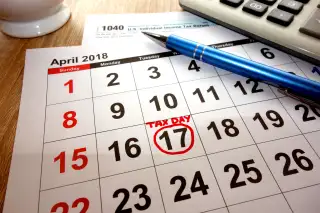Tax Day Wasn't Always In April. Here's What Happened

Ever wonder why Tax Day falls in the middle of April?
For many of us, paying taxes is as much a part of spring as Daylight Savings Time or the start of a new baseball season. But it hasn't always been this way. Although Americans have been regularly paying income tax for over a century, the first Tax Day fell much earlier in the year.
In fact, if you’re one of the millions of Americans scrambling to file your taxes by April 15 every year (except for years like this one, when Tax Day falls on April 17), be thankful it isn’t 1914.
That's the year when the Form 1040 -- the familiar piece of paper we still use to report taxable income -- first appeared. And it informed taxpayers that 1913's tax returns were due "in the hands of the Collector of Internal Revenue on or before March 1," meaning tax payers were forced to prepare tax forms during the short, cold days of February.
Why? One common explanation is that March 1, 1914, was a year and some change after the institution of the 16th Amendment, which cemented Congress’s power to collect income tax upon its ratification in February 1913. But the 16th Amendment didn't institute income tax itself -- that was the job of the Revenue Act of 1913, which was signed into law in October of that year.
Rather, the March 1 deadline was likely chosen to give filers enough time to prepare, says Joseph Thorndike, a historian with tax publisher Tax Analysts. "The long story short is sort of underwhelming," Thorndike says. "There’s no reason they said March 1 except it’s reasonably close to the end of the tax year, but not so close that it’s difficult to get the paperwork ready."
In a nation of procrastinators, March 1 wasn't around for long, however. Tax Day was moved to March 15 in 1918, Thorndike says. It remained that way until the 1950s, when the deadline was shifted again, this time to April 15. By 1954, many more people were filing taxes than they were 50 years prior.
"Millions of middle class people were paying an income tax," Thorndike said. "It became clear that there were a lot of people struggling to make the deadline."
Because of this, the U.S. government pushed Tax Day back to the middle of April with an overhaul of the IRS Tax Code in 1954, where it has remained since then. And, although the U.S. has a history of rescheduling Tax Day, Thorndike says April 15 is likely here to stay.
"I'm skeptical that anyone would be interested," says Thorndike, on the possibility of Tax Day getting rescheduled in the future. "I think it works reasonably well at this point."
That said, Tax Day isn't always on April 15. If April 15 is on a weekend or federal holiday, the tax deadline is pushed to the nearest business day. Tax Day falls on April 17 this year because April 15 is a Sunday and April 16 is Emancipation Day, a holiday celebrated in the District of Columbia.